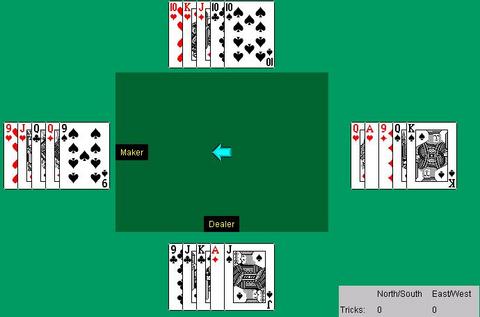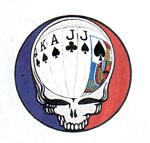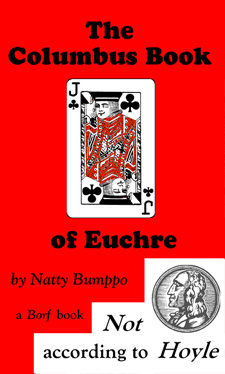"Lead Black and You'll Never Go Back"
by: Henword 6-15-06
You're left of the dealer (west), the score is 9-9, and the dealer turns down a diamond king.
So you call next (hearts), lead your right bower by rote, and then a spade to your partner's king, which by luck holds. Your partner, of course, doesn't have a better lead than diamonds. Spades are drained and south has no hearts, so it is apparent that a heart or spade is likely to be overtrumped by north.
North is an intuitive sort of gambler. He trumps his partner's diamond ace with the king, leads the left bower, draining both the ace and nine, and the club lead is good for euchre.
East is the self-righteous sort, so a fight ensues over why west didn't know to lead clubs at trick two.
Who knows why north guessed a split in the trump? If he had assumed west to have the trump ace and nine and discarded the club on the diamond ace, east/west would have won. But east and west are fighting over the wrong issue.
Let us take another look at the hand that west has;
The Henword Pages
The Henword Pages

henword
North
West
East
(Dealer)
South
10
J
K,10
10
K,Q
9
VOID
A,Q
Q
9
Q
J,9
K,J,9
A
VOID
J
Turns Down
K
Score:
9-9
All that west knows is that south turned down the diamond king.
Even with his weak holding, calling next is the right sort of gamble at 9-9 when holding the right bower. And, all but a novice euchre player knows, every good boy does fine when he leads his right bower having called trump. But wait a minute...what is west really trying to accomplish here? Does he have any aces he wants to cash after draining a round of trump? Well...no. Does he really think he is going to establish the trump nine by dropping the big boss, particularly when four suited? (A case of good habits trumping sound thinking?) Is he going to alternatively lead diamonds when south has turned down that suit? Of course not! So why not gamble on a black suit lead on trick one? You win in either case.
A club lead on trick one is an obvious winner. East ruffs and he either cashes his spade, leaving the third trick to west's right bower, or he leads a diamond which south gets his ace, and the spade return (north's discard) leaves north end-played.
A spade lead also leaves north end-played on east's diamond return. Of course if east returns with his second spade, west could mess things up by trumping with the nine, but that is not the best play. The only reason to ruff an obvious honor with the lowest trump is if you want the lead, which is not the case here.
I should also mention one scenario where a spade lead could result in euchre, assuming reasonable play by all parties:
East returns a heart lead and west, observing south's heart void, leads a diamond which north ruffs, cashes the left and leads clubs to euchre. But as I've demonstrated, a black lead is still more likely to win with this exceptional hand. - Henword
vol. 2
When asked what he thought about the hand in question above, Natty Bumppo, author of the book "The Columbus Book of Euchre", offered the following insight:
North should ordinarily play second hand low, and if he throws up the left bower in this situation he is asking for it. Let's assume that he is prudent and plays the king of hearts, which East takes with the ace of hearts. East leads back the king of spades to promote his queen and it flies. My (West's) right bower is then good for the third point and the game.
But, let's let North play rashly and take the first trick with his left bower. If he leads clubs, he's dead. If he leads spades, he's dead. If he leads trump, he promotes his partner's king of clubs for the euchre; but how is he to know to lead trump against the one who called it?
Henword says that, left of the dealer and having called "next," you "lead your right bower by rote." Not by my rote. I have preached and preached not to lead your top card when you call "next." The danger is stripping your partner's bower with your own. That's not the case here, but a low trump lead -- the nine of hearts -- works better anyway.
Let's play it Henword's way, leading and taking the first trick with the right bower. Where is the logic in leading clubs instead of spades? Only in the pips. Singletons, both. Had I taken the first trick with the right bower, I would not have led the spade. But I would not have led the club, either. I would have led the diamond, which the dealer turned down: and I now know he has no trump.
I would have been euchred.
My best shot remains with leading the nine of hearts (trump) to the first trick.
Henword's suggestion to lead black is merely an idiosyncratic solution to an idiosyncratic configuration. It works, but it does not make for a general principle. The general principles remain to lead the trump you called, and to lead low trump when you call "next."
This is a hand that I would not use for a column or for an example. There are too many variables, and too many ways to play it. Who wins, in the end, depends on "style" (for example, always lead low when going "next") more than on good play.
I suppose that no situation a euchre player will ever encounter during a game could possibly be more critical than one that occurs when the score is 9-9. No more cards will be dealt. Desperation is felt on both sides. You and your partner must win with the cards you are currently holding in your hand, from whatever position you are sitting.
The hand discussed on this page actually happened to me, and the score really was 9-9. I lost. After the smoke cleared, I decided to examine the hand closer to determine what I could have done that might have possibly won the game. I also sent it to Henword, who chose to write about it here in this column.
The first thing that I noticed was that I could have won simply by passing. North would have likely called hearts for me, and I wouldn't have reciprocated with a trump lead (more on "Leading trump on defense") or a diamond lead (since the dealer turned one down), and thus possibly euchred him. But this is like saying that I would call (or raise) with the weak hand that a poker player on t.v. has, when he doesn't know he holds the winner. I can see both players hands on t.v., so making the right play is easy from the comfort of my armchair. It's the same kind of thing here. I now know that North was holding three hearts including the left bower. The score was 9-9, the dealer turned down a diamond, and I knew my opponents didn't pass very often. The dealer turning down the king of diamonds almost certainly ruled out the possibility that he had the jack of diamonds. That's all the info that was available to me at the time. I figured that I had to make a move, and I still believe that the heart bid was correct, even though it was a gamble.
Imagine for a moment that the dealer and his partner's hands were switched. North would have ended the game in devastating fashion with a club laydown had I passed. You just can't know these things during a euchre game (providing that there is no cheating going on).
As far as general principle goes, perhaps it is a good idea to throw a "hail Mary" to your partner on a desperation "next" call (two trump and three turds of different suits) instead of just mechanically leading trump. When you have no side aces to establish with a trump lead, the trump may only draw a good card from your partner. Henword's point may be to rely more on Commandment #2 - Count on your partner for a trick, or at least throw something out there, say a prayer, and see what unfolds. An outside force like the "kitty" might even help you out.
Keep in mind, as Henword and Natty both said (in so many words), this hand is an exceptional situation, and is not to be confused with a "rock solid" strategy formula. It is presented here just to tickle the noodle between your ears.
Special thanks to Natty Bumppo for the editorial, and also Henword for encouraging Natty's opinion to be included with his column, especially after he knew that it didn't agree with his own.
- Harvey "the Rabbit" Lapp
And now my turn...

Natty Bumppo
(possibly more than just a few years ago)

Score 9-9
Dealer turned down KD




